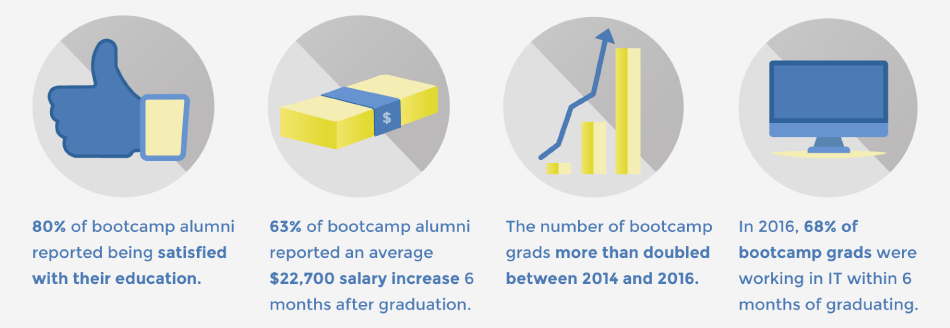Cost and Return on Investment

The decision to enroll in a coding bootcamp involves a significant financial commitment. Understanding the potential return on investment (ROI) is crucial before making this decision. This section will analyze the costs associated with bootcamps, compare them to potential salary increases, and provide examples to illustrate the potential financial outcomes.
Are coding bootcamps a scam – The total cost of a coding bootcamp is a multifaceted figure encompassing tuition fees, living expenses (rent, food, utilities), and the opportunity cost of lost income during the program. These expenses can vary significantly depending on the bootcamp’s location, duration, and intensity. For instance, a full-time, intensive program in a major city like San Francisco will likely be far more expensive than a part-time, online program. Furthermore, graduates’ starting salaries are influenced by factors such as the specific skills learned, the job market in their location, and their prior experience. Therefore, a thorough assessment of individual circumstances is essential before determining whether a bootcamp is a worthwhile financial investment.
Bootcamp Costs and Average Starting Salaries
Several factors influence the overall cost-benefit analysis of a coding bootcamp. Direct costs include tuition fees, which vary widely based on the institution’s reputation, program length, and location. Indirect costs include living expenses, which are heavily influenced by the bootcamp’s location, and the opportunity cost of forgone income during the program’s duration. Comparing these costs to the average starting salary for graduates provides a clearer picture of the potential ROI.
| Bootcamp Name | Location | Total Cost (Estimate) | Average Starting Salary (Estimate) |
|---|---|---|---|
| App Academy | Online/San Francisco | $17,000 – $20,000 (Tuition) + Living Expenses | $80,000 – $100,000 |
| Flatiron School | Multiple Locations (Online, NYC, etc.) | $15,000 – $18,000 (Tuition) + Living Expenses | $70,000 – $90,000 |
| General Assembly | Multiple Locations (Worldwide) | $14,000 – $17,000 (Tuition) + Living Expenses | $65,000 – $85,000 |
| Tech Elevator | Multiple Locations (Midwest US) | $13,000 – $16,000 (Tuition) + Living Expenses | $60,000 – $80,000 |
Note: These are estimates and actual costs and salaries can vary significantly. Living expenses are not included in the total cost and should be considered separately. Salary ranges reflect average starting salaries and can vary depending on location, experience, and specific job role.
Examples of Successful Bootcamp Graduates
While generalized statistics are helpful, individual success stories offer a more tangible understanding of potential ROI. For instance, a graduate from App Academy might secure a junior software engineer role at a tech startup with a starting salary of $90,000. After two years, with experience and promotions, their salary could increase to $110,000 or more. Similarly, a graduate from Flatiron School might find employment as a front-end developer earning $75,000 initially, increasing to $95,000 within three years. These are just examples, and individual experiences will vary. However, they illustrate the potential for significant income growth following a successful bootcamp completion.
Instructor Expertise and Support

Coding bootcamps vary significantly in the quality of instruction and support they offer students. Understanding the instructors’ qualifications and the support systems in place is crucial for determining the value of a particular program. A strong support network can be the difference between success and failure in the intensive learning environment of a coding bootcamp.
The qualifications and experience of instructors are a key factor influencing the quality of education. Many reputable bootcamps employ instructors with extensive professional software development experience, often holding advanced degrees or possessing a proven track record of successful projects. However, it’s important to note that the experience level can vary between instructors within a single bootcamp, and some smaller programs may rely on instructors with less extensive professional experience. Transparency regarding instructor backgrounds is essential for prospective students.
Instructor Qualifications and Experience
Several prominent coding bootcamps boast instructors with impressive credentials. For instance, Flatiron School often highlights instructors with backgrounds in leading tech companies and significant open-source contributions. General Assembly frequently features instructors with Master’s degrees in computer science or related fields and years of industry experience. App Academy emphasizes a rigorous instructor selection process, focusing on both technical skills and teaching ability. These examples showcase the range of expertise found across different bootcamps, emphasizing the importance of researching specific instructor profiles before enrollment.
Student Support Systems
Coding bootcamps typically offer a range of support services designed to help students succeed. These commonly include mentoring programs that pair students with experienced developers for guidance and feedback, career services that assist with resume building, job searching, and interview preparation, and robust technical support to address coding challenges and troubleshooting issues. The comprehensiveness and quality of these support systems can vary greatly between bootcamps.
Comparison of Bootcamp Support Services, Are coding bootcamps a scam
| Bootcamp Name | Mentoring Program | Career Services | Technical Support |
|---|---|---|---|
| Flatiron School | Individualized mentorship with experienced developers, regular check-ins. | Resume reviews, mock interviews, job search workshops, networking events. | Dedicated support staff, online forums, office hours with instructors. |
| General Assembly | Mentorship opportunities, peer support networks. | Career coaching, resume and portfolio building assistance, job board access. | Instructor-led workshops, online resources, technical Q&A sessions. |
| App Academy | Pairing with senior developers for code reviews and guidance. | Comprehensive career services, including job placement assistance. | Extensive online resources, dedicated support staff, regular check-ins. |
| Thinkful | 1-on-1 mentorship with experienced instructors throughout the program. | Career counseling, resume and portfolio reviews, interview prep. | Dedicated support staff available through various channels (email, chat, phone). |
Ethical Considerations and Misleading Marketing: Are Coding Bootcamps A Scam

The rapid growth of the coding bootcamp industry has unfortunately led to some unethical practices and misleading marketing tactics. Understanding these issues is crucial for prospective students to make informed decisions and avoid potential pitfalls. Transparency and ethical conduct should be paramount in any educational institution, and the coding bootcamp sector is no exception.
Misleading marketing tactics can significantly impact a student’s decision to enroll and their overall experience. It’s important to critically evaluate the claims made by bootcamps and avoid being swayed by aggressive or unrealistic promises.
Misleading Marketing Practices
Some bootcamps employ aggressive marketing strategies that can border on misleading. Examples include exaggerating job placement rates, using testimonials selectively to highlight successes while ignoring failures, and creating a sense of urgency to pressure prospective students into enrolling. Inflated claims about average salary increases after bootcamp completion are also common. For instance, a bootcamp might advertise a significantly higher average salary than what graduates actually achieve, omitting factors such as prior experience and individual performance. Similarly, showcasing a small number of highly successful graduates while neglecting the larger picture of placement outcomes can create a distorted impression of the program’s effectiveness.
Unrealistic Job Placement Guarantees
The ethical implications of promising unrealistic job placement guarantees are substantial. While some bootcamps may offer assistance with job searching, a guarantee of employment is often impossible to deliver reliably. This is due to various factors beyond the bootcamp’s control, including the fluctuating job market, individual student performance, and the competitive nature of the tech industry. Bootcamps that make such guarantees often fail to clearly define the terms and conditions, leading to potential disputes and disillusionment for students who don’t secure employment after graduation. The pressure to fulfill these promises can also incentivize bootcamps to compromise on the quality of education or engage in other questionable practices.
Importance of Thorough Research and Due Diligence
Before enrolling in any coding bootcamp, prospective students should conduct thorough research and due diligence. This involves investigating the bootcamp’s reputation, examining student reviews from multiple sources, verifying job placement statistics independently, and carefully reviewing the curriculum and learning materials. It’s crucial to look beyond marketing materials and seek out objective assessments of the bootcamp’s effectiveness. Checking accreditation, if applicable, and comparing different bootcamps based on factors such as cost, location, curriculum, and instructor experience is also vital. Contacting alumni and asking about their experiences can provide invaluable insights that are often absent from official marketing materials. By carefully evaluating all available information, prospective students can make informed decisions and avoid potentially disappointing or financially damaging experiences.


Tim Redaksi